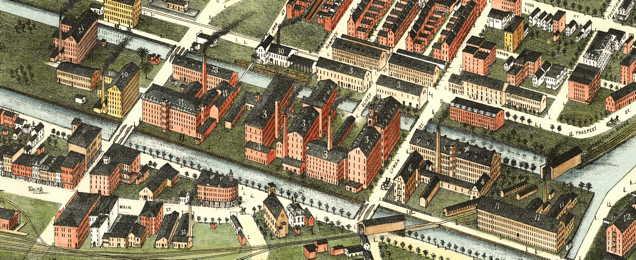A workshop for faculty
Monday & Tuesday, August 13 & 14, 2012
Amherst College, Webster 102
Keynote Presentation: Exploring the Spatial Humanities
Online Resources
In recent years a plethora of new tools and methods have become available for transforming and studying the materials of traditional humanities research, along with new forms of digital media. Many aspects of the humanities also involve geospatial relationships, and many of these tools, such as Geographic Information Systems (GIS), make it significantly easier to collect, analyze, and understand spatial data.
Many examples of digital humanities are discussed and catalogued at sites like http://chronicle.com/blogs/profhacker/checking-in-with-digital-humanities-questions-answers/, http://dhcommons.org/projects, and http://www.digitalhumanities.org/. A cascade of new books address the subject, in particular the spatial humanities. And the National Endowment for the Humanities (NEH) has even established an Office of Digital Humanities.

 Now the Five College Consortium has begun a Digital Humanities Initiative with support from the Mellon Foundation, and is sponsoring this workshop on Spatial Techniques for the Digital Humanities. It will focus on the activities, content, and media of interest to humanists, including current projects in the Five Colleges. Plenty of time and opportunity will be available for participant networking, discussion, and discovery.
Now the Five College Consortium has begun a Digital Humanities Initiative with support from the Mellon Foundation, and is sponsoring this workshop on Spatial Techniques for the Digital Humanities. It will focus on the activities, content, and media of interest to humanists, including current projects in the Five Colleges. Plenty of time and opportunity will be available for participant networking, discussion, and discovery.
Instructors: Andy Anderson, Amherst College; Jon Caris and Cory Keeler, Smith College
The preliminary schedule is below. If you would like to attend or have questions, please fill out the response form.
Day One: Monday August 13, 2012
| Time | Topic |
| 8:30 – 9:00 | Coffee |
| 9:00 – 9:15 | Introductions |
| 9:15 – 10:30 | Collaborative Mapping 1: Presentation Platforms Multi-user mapping environments: Cityscapes, Hypercities |
| 10:30 – 10:45 | Break |
| 10:45 – 12:00 | Collecting Geographic Data GPS; Smart Phones and Tablets and Apps; Geotagging Digital Photos |
| 12:00 – 1:00 | Lunch |
| 1:00 – 2:15 | Collaborative Mapping 2: Web Mashups Combining online data sources with a web map to visualize dynamic relationships: Google Docs/Tables/Maps; ArcGIS Online |
| 2:15 – 2:30 | Break |
| 2:30 – 3:45 | Geospatial Visualization 3-D, photoreferencing, building models, tours: Google Earth |
| 3:45 – 4:00 | Coffee |
| 4:00 – 5:00 |
Keynote Presentation: Exploring the Spatial Humanities New tools, including software such as Google Earth and hardware such as smartphones, are rapidly changing the way we gather and store information. At the same time Google Maps, Fusion Tables, and competing technologies have streamlined the process of integrating and visualizing this information. These innovations are being adopted in the humanities, where new platforms for teaching, research, and collaboration are emerging, and the results are also generating a wider audience for materials that were previously considered to be “raw data”. Here we will present several approaches to organizing and visualizing historical information — historical gazetteers, image archives, web maps, and historical GIS — and their merits, limitations, and discuss potential application for other digital humanities projects. |
| 5:00 – 5:30 | Reception |
Day Two: Tuesday August 14, 2012
| Time | Topic |
| 8:30 – 9:00 | Coffee |
| 9:00 – 10:30 | Creating Maps from Text Data Geoparsing, mapping place names and street addresses: ArcGIS |
| 10:30 – 10:45 | Break |
| 10:45 – 12:15 | Positioning Historical Maps Online Map Libraries & Google Earth Georeferencing scanned maps to line up with current spatial data: ArcGIS |
| 12:15 – 1:15 | Lunch |
| 1:15 – 2:45 | Abstracting Historical Maps Extracting and editing features from scanned maps; analyzing your results: ArcGIS |
| 2:45 – 3:00 | Break |
| 3:00 – 4:30 | Cartographic Enhancement Preparing maps for publication — conventions, projections, color, labeling, elements, representation, etc.: ArcGIS |
